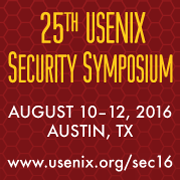Egalitarian Computing
Alex Biryukov and Dmitry Khovratovich, University of Luxembourg
In this paper we explore several contexts where an adversary has an upper hand over the defender by using special hardware in an attack. These include password processing, hard-drive protection, cryptocurrency mining, resource sharing, code obfuscation, etc.
We suggest memory-hard computing as a generic paradigm, where every task is amalgamated with a certain procedure requiring intensive access to RAM both in terms of size and (very importantly) bandwidth, so that transferring the computation to GPU, FPGA, and even ASIC brings little or no cost reduction. Cryptographic schemes that run in this framework become egalitarian in the sense that both users and attackers are equal in the price-performance ratio conditions.
Based on existing schemes like Argon2 and the recent generalized-birthday proof-of-work, we suggest a generic framework and two new schemes:
- MTP, a memory-hard Proof-of-Work based on the memory-hard function with fast verification and short proofs. It can be also used for memory-hard time-lock puzzles.
- MHE, the concept of memory-hard encryption, which utilizes available RAM to strengthen the encryption for the low-entropy keys (allowing to bring back 6 letter passwords).
Keywords: MTP, MHE, Argon2, memory-hard, asymmetric, proof-of-work, botnets, encryption, timelock puzzles.
Open Access Media
USENIX is committed to Open Access to the research presented at our events. Papers and proceedings are freely available to everyone once the event begins. Any video, audio, and/or slides that are posted after the event are also free and open to everyone. Support USENIX and our commitment to Open Access.
author = {Alex Biryukov and Dmitry Khovratovich},
title = {Egalitarian Computing},
booktitle = {25th USENIX Security Symposium (USENIX Security 16)},
year = {2016},
isbn = {978-1-931971-32-4},
address = {Austin, TX},
pages = {315--326},
url = {https://www.usenix.org/conference/usenixsecurity16/technical-sessions/presentation/biryukov},
publisher = {USENIX Association},
month = aug
}



















connect with us